| Pages:
1
2 |
nux vomica
Hazard to Others
  
Posts: 267
Registered: 18-7-2013
Member Is Offline
Mood: No Mood
|
|
Detonator casings
Here's a neat find, if you open up 9 volt alkaline batterys the cells are 8 mm diameter and long enough to load the equivalent of a no8
detonator.
The caseing is very thin nickel maybe stainless steel but its the closest ive seen to a off the shelf caseing .
Nux
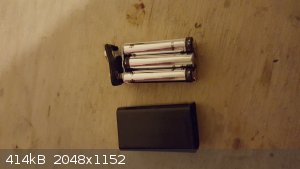 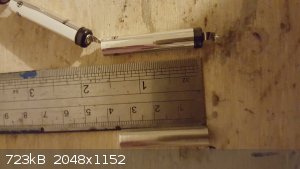 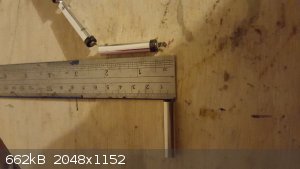
|
|
|
NeonPulse
Hazard to Others
  
Posts: 417
Registered: 29-6-2013
Location: The other end of the internet.
Member Is Offline
Mood: Isolated from Reality! For Real this time....
|
|
Try these! That is if you are willing to risk importing them. I know that I'm not. But if you live in Europe or a country fairly lax then there
should be no problems. 
http://pyrofire.eu/detail.php?product=114#.VPqPj2SUde8
|
|
|
greenlight
National Hazard
   
Posts: 754
Registered: 3-11-2014
Member Is Offline
Mood: Energetic
|
|
@nux, is one end of those cells inside the battery sealed or are they open ended once you remove the contents? I can't see on the pictures
Be good, otherwise be good at it 
|
|
|
Loptr
International Hazard
    
Posts: 1348
Registered: 20-5-2014
Location: USA
Member Is Offline
Mood: Grateful
|
|
I wouldn't be afraid to import those. They are used for making sensors and used as the housing. You could also contract out their manufacture as there
are several companies in a Google search that will produce closed end tubes.
|
|
|
hissingnoise
International Hazard
    
Posts: 3940
Registered: 26-12-2002
Member Is Offline
Mood: Pulverulescent!
|
|
NP's aluminium tubes look like the right stuff, but Pyrofire's shipping seems a bit rip-off!
Has anyone here had any dealings with them, I wonder?
|
|
|
Bert
Super Administrator
        
Posts: 2821
Registered: 12-3-2004
Member Is Offline
Mood: " I think we are all going to die. I think that love is an illusion. We are flawed, my darling".
|
|
Looking at their prices for Chinese shells, fuses, quick match, pyrotechnic chemicals & etc., they are a bit high. Oddly, the electric match
prices were sort of OK (.5€) Didn't check shipping costs, as not ordering!
The picture does not show if the output end of the empty capsule is properly concave.
|
|
|
Hennig Brand
International Hazard
    
Posts: 1284
Registered: 7-6-2009
Member Is Offline
Mood: No Mood
|
|
An experimenter could probably easily make a little punch and anvil set for making/shaping a suitable dimple/concaved end in the tubes if needed.
"A risk-free world is a very dull world, one from which we are apt to learn little of consequence." -Geerat Vermeij
|
|
|
Herr Haber
International Hazard
    
Posts: 1236
Registered: 29-1-2016
Member Is Offline
Mood: No Mood
|
|
I get mine from there. Very happy with these tubes. I'll post pictures of tests I made with them some day. I've got some copper ones that I'll try
with something else than LA of course.
I get my fuse from them too. Their Visco is excellent and their Bickford fuse just need a roll of tape to make them a perfect fit for the tubes before
crimping. Nice people, we exchanged a couple e-mails at a time.
The specifications are wrong though:
Outer: a tad more than 5mm
Inner: a tad less than 5mm
Lenght: 56mm
(Sorry, my "whatever you call this in English" isnt digital
They also have shorter tubes with a bigger diameter that I havent found a use for. I got some to see if they gave me ideas.
Outer: a tad less than 7mm
Inner: 6mm
Lenght: 36mm
Also, note that the way these tubes are made the walls are thicker at the bottom than at the mouth.
|
|
|
Herr Haber
International Hazard
    
Posts: 1236
Registered: 29-1-2016
Member Is Offline
Mood: No Mood
|
|
Quote: Originally posted by Hennig Brand  | | An experimenter could probably easily make a little punch and anvil set for making/shaping a suitable dimple/concaved end in the tubes if needed.
|
An experimenter could. The bottoms are flat and as mentioned above, slightly thicker than the walls of the tubes.
The bottoms are marked (not deeply) with an "A" for Aluminium I guess.
Also, it seems to me that they are not perfect tubes. The open end is ever so slightly larger than the closed end.
I couldnt give data, but I noticed differences in behaviours when working with these tubes and different loads. One of my tools would get stuck with
lesser loads.
Ah, maybe that's something I should explain if or rather when I create a topic about my experimentations.
@Bert: I belive they use these tubes, fill them with black powder and crimp whatever they need on top. I've gotten some other supplies from them (no,
not chemicals they're way to expensive) but their finished products are sometimes very nice for the price.
I have a couple of pyrotechnic igniters from them where the bottom is deeply marked with an X to ensure it breaks there. They are the same that they
use for some smoke bombs.
I guess they are selling the tubes alone because... well maybe they thought someone might want to use these tubes to house a sensor for example. Or
other 
[Edited on 16-3-2016 by Herr Haber]
|
|
|
nux vomica
Hazard to Others
  
Posts: 267
Registered: 18-7-2013
Member Is Offline
Mood: No Mood
|
|
Quote: Originally posted by greenlight  | | @nux, is one end of those cells inside the battery sealed or are they open ended once you remove the contents? I can't see on the pictures
|
Yep Greenlight you cut the crimped end off and its a deep cup .
Added a cople of other photos with some more dimensions including sidewall and bottom thickness
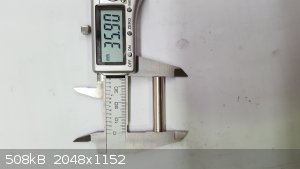 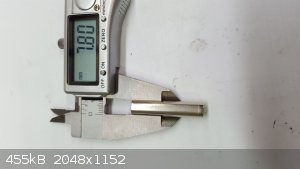 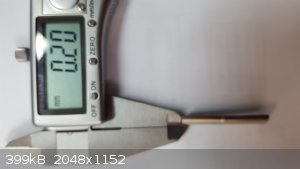 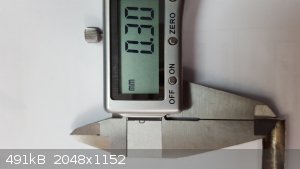
[Edited on 17-3-2016 by nux vomica]
|
|
|
greenlight
National Hazard
   
Posts: 754
Registered: 3-11-2014
Member Is Offline
Mood: Energetic
|
|
Thanks Nux, nice find there. I have been using aluminum tubing from a hobby shop but the bottom's has to be sealed before filling them
Be good, otherwise be good at it 
|
|
|
DrManhattan
Harmless

Posts: 32
Registered: 24-1-2015
Member Is Offline
Mood: No Mood
|
|
I have thought of the idea of using an ETN/epoxy mixture for making a putty to seal the end of open tubes for use as a blasting cap. Once dried it
should be reasonably strong, water tight, and unlike an inert plug it shouldnt decrease its initiation ability so long as it detonates from the
pressed ETN charge above it. What do you guys think?
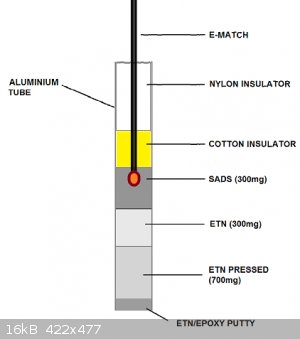
|
|
|
Laboratory of Liptakov
International Hazard
    
Posts: 1407
Registered: 2-9-2014
Location: Technion Haifa
Member Is Offline
Mood: old jew
|
|
Your plug in output segment is too much thick. Without description of thickness. Here is more safety construction:
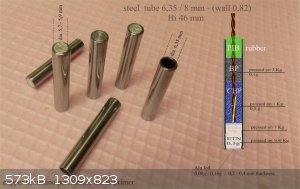
Development of primarily - secondary substances CHP (2015) Lithex (2022) Brightelite (2023) Nitrocelite and KC primer (2024)
|
|
|
Daffodile
Hazard to Others
  
Posts: 167
Registered: 7-3-2016
Location: Highways of Valhalla
Member Is Offline
Mood: Riding eternal
|
|
How would you crimp them?
|
|
|
Bert
Super Administrator
        
Posts: 2821
Registered: 12-3-2004
Member Is Offline
Mood: " I think we are all going to die. I think that love is an illusion. We are flawed, my darling".
|
|
Traditionally, a fuse cutting and crimping tool.
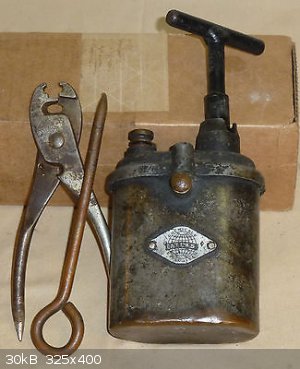
Occasionally, I have used a small tubing cutter with a deliberately dulled cutting wheel, this gives a very uniform crimp. But requires having my
hands WAY too close to the cap.
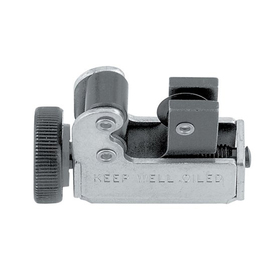
|
|
|
MineMan
International Hazard
    
Posts: 1012
Registered: 29-3-2015
Member Is Offline
Mood: No Mood
|
|
Bert,
You have WAY too much cool stuff and antiques, those would fetch a lot of $.
Ok Time for safety talk. LOL, steel casings of that thickness should NOT be used for detonators, the shrapnel form that would be inconceivable. Steel
wire gloves under steel wire gloves or Kevlar was shown to greatly reduce injury by Robert Matyas... but I have tried this, dexterity is sacrificed.
The most ideal detonator casing is thin (.05mm or less Al), lets talk about why. I have seen FLAKES of copper from a copper detonator casing pierce
a 5 gallon bucket, these flakes would NOT register on a milligram scale. Copper is the worst material, because it is elastic, therefore the casing
will bend before ultimate failure, producing the HIGHEST Gurney velocity... In addition, at high velocities penetration is modeled by two main
variables, the density of the projectile, and the density of the target. The hardness does not matter at velocities over 1km/s. Therefore, copper is
the worst material for shrapnel, tantalum, probably being the most violent material imaginable... and hence is used for advanced shape charges.
Steel is brittle, but at a 2mm thickness, the fragments must be ungodly. DDT of CHP is still possible under .5mm aluminum, and should be used. your
hand might miss some fingers but you wont have holes out your backside, and yes, I have seen copper FLAKES pierce 1mm steel after going through tough
plastic. According to Matyas, even one pair of steel wire gloves helps a lot,same with kevlar or spectra. it will at the very least protect your
flesh and hold bones and fingers together.
A cap like the above shown could really easily kill, not just mame. If the material cannot achieve ddt in .5mm Al, then a steel sleeve should be
used, as it is in industry caps, but thick enough where it only deforms, not fragments. it only needs to cover 100mg of the material until it ddts...
No picture online shows a modern cap. But there is a thick sleeve that covers the LA, it helps if a truck runs over it, and it can help with our
members too.
|
|
|
Fulmen
International Hazard
    
Posts: 1725
Registered: 24-9-2005
Member Is Offline
Mood: Bored
|
|
Bert: I have the same unit. Still works :-)
We're not banging rocks together here. We know how to put a man back together.
|
|
|
C6(NO2)5CH2CH(CH3)N(NO2)2
Harmless

Posts: 43
Registered: 4-4-2018
Member Is Offline
Mood: No Mood
|
|
I've opened up a 9v battery. Those are nicely shaped and sized casings. But the battery I opened had a very very hard graphite/Manganese
oxide layer up against the casing wall. It could be removed in chips, but not removed completely without destroying the steel casing. Are there any
special tips for getting rid of that layer, or should I just be more perseverent with the flat-tip screwdriver?
Put that in your pipe and smoke it!
|
|
|
XeonTheMGPony
International Hazard
    
Posts: 1640
Registered: 5-1-2016
Member Is Offline
Mood: No Mood
|
|
https://www.aliexpress.com/item/5-pieces-OD-6mm-OD-7mm-OD-8m...
If you know spechs, there are many possibilities
|
|
|
OneEyedPyro
Hazard to Others
  
Posts: 280
Registered: 7-10-2015
Member Is Offline
Mood: No Mood
|
|
Quote: Originally posted by C6(NO2)5CH2CH(CH3)N(NO2)2  | | I've opened up a 9v battery. Those are nicely shaped and sized casings. But the battery I opened had a very very hard graphite/Manganese
oxide layer up against the casing wall. It could be removed in chips, but not removed completely without destroying the steel casing. Are there any
special tips for getting rid of that layer, or should I just be more perseverent with the flat-tip screwdriver? |
Submersion in dilute hydrogen peroxide should clean them up nicely if it's MnO2 inside.
Peroxide would likely begin to corrode the casings pretty quickly though.
|
|
|
ManyInterests
National Hazard
   
Posts: 937
Registered: 19-5-2019
Member Is Offline
|
|
While I still haven't made my primary or secondary yet. I have been thinking very hard about the detonator design, because without that, there is no
point in bothering to try making energetics.
While I've seen people speak very highly of aluminum tubes, I've also seen that cardboard or rolled printer paper can be used as a detonator housing.
But I've also been looking at using the body of a ballpoint pen as a house. I've attached a blurry pic of what I plan on using.
The pen's inner diameter is apparently 6.5mm or so, because I fit a 6.35 mm wooden dowel in easily. When I removed the cap and the actual pen
head/handle the result was a very nice plastic tube. I wanted it to be a little longer. So I cut off the head of the cap and sealed the end with hot
glue, then I used more hot glue to completely seal the cap to the body (I put some near the edge of one side and pressed the head against it, bringing
hot glue underneath it. The connection is very tight).
I made a paper funnel that will let me attach a glass lab funnel to that end, allowing me to pour the energetics into it easily (albeit I will need to
tape them together to make a firm connection). I filled it with 2 grams worth of sugar just to see if it'll fit that much, and it left plenty of space
for me to insert an electric match and seal the other end with epoxy.
Would this work as a detonator?
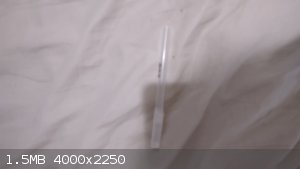
|
|
|
macckone
Dispenser of practical lab wisdom
    
Posts: 2168
Registered: 1-3-2013
Location: Over a mile high
Member Is Offline
Mood: Electrical
|
|
I like christmas tree lights.
And now is the season to get them.
They come with wire preinstalled.
fill and drain thin nitrocellulose syrup to coat.
Then primary and ETN.
Seal with thick nitrocellulose syrup.
Side note, the metal cans in 9v are usually zinc.
Same as other batteries.
Using a smaller christmas light initiator with a can filled with ETN would make an excellent larger initiator.
|
|
|
ManyInterests
National Hazard
   
Posts: 937
Registered: 19-5-2019
Member Is Offline
|
|
Quote: Originally posted by macckone  | I like christmas tree lights.
And now is the season to get them.
They come with wire preinstalled.
fill and drain thin nitrocellulose syrup to coat.
Then primary and ETN.
Seal with thick nitrocellulose syrup.
Side note, the metal cans in 9v are usually zinc.
Same as other batteries.
Using a smaller christmas light initiator with a can filled with ETN would make an excellent larger initiator. |
I got halloween lights (which come in orange and purple) and clear christmas lights. They are good, but with many small and long caps (like mine) you
will need to remove the bulb entirely in order to make it fit. This isn't a problem. I'm very good at cutting the tops off and filling them with
pyrogen (I used crushed match heads).
The only thing you need to know is that christmas light bulbs are polarized, meaning one wire is positive while the other is the ground. If you are
working with colored christmas lights, make sure you use the correctly corrected wires so you can connect them to the power supply correctly,
otherwise they might not ignite correctly.
If they are clear and you see the filament on the inside, the longer part is the positive while the shorter one is negative, makes it easier to get
the wires properly connected.
But if you completely remove the bulb from the container and attach the wires directly to the leg wires you do need take care that they don't touch
and create a short, this might cause your bulb not to light up when it needs to.
Personally I perfer my own matches. They are quite current and voltage sensitive (much more so than christmas lights) but I do have experience
building them and I did make sure what ever I have in mind will fit in my intended cap.
But that being said. If it works, it works.
My question still remains on making the setup to do the filling and pressing (the pressing is what worries me the most. Which is why I want to use
only the most insensitive explosives out there for that purpose. ETN as the secondary and NHN as the primary (with fast black powder as the
initiator).
but I am thinking about something. Is picric acid less sensitive than ETN? What about it's compatibility with NHN? I know picric acid hates all metals
except aluminum, but would it eat through my plastic pen body and the hot glue stopper I have at the end?
I am thinking a simple homemade hydraulic press like this might suffice:
https://www.youtube.com/watch?v=aWVqmgX-VrY
I know it looks all childish, but aslong as it lets me operate the pressing from afar (and keep the cap in a container that will contain the blast and
muffle the sound) I am OK with it.
[Edited on 20-10-2021 by ManyInterests]
|
|
|
macckone
Dispenser of practical lab wisdom
    
Posts: 2168
Registered: 1-3-2013
Location: Over a mile high
Member Is Offline
Mood: Electrical
|
|
That is an interesting hydraulic press.
I have been using a pretty sturdy metal press and a lever (pvc pipe) that allows me some distance.
But that could literally work from 100 ft away.
You need cheaper christmas lights, mine just use miniature light bulbs that run on 3v.
Hook 18v (two nine volts) to one and it vaporizes the filament pretty good.
The way the filament is oriented one side is longer than the other but it isn't 'polarized' in the sense that an LED is.
|
|
|
ManyInterests
National Hazard
   
Posts: 937
Registered: 19-5-2019
Member Is Offline
|
|
| Quote: |
You need cheaper christmas lights, mine just use miniature light bulbs that run on 3v.
Hook 18v (two nine volts) to one and it vaporizes the filament pretty good.
The way the filament is oriented one side is longer than the other but it isn't 'polarized' in the sense that an LED is. |
I think we're using the same incandescent mini-bulbs. I got them from a thrift store. They have an 'outdoor' mini-bulb that is rated for 3.5 volts
each and an 'indoor' one for 2.5 or 3 volts. LED lights are useless for pyrotechnics.
I did make one into an electric match and it did light up with a small CR2032 button cell, but a 9v is necessary to really get to light up. Albeit you
must not forget that the filament will still burnout once you break the bulb. They tend to not like the open air that much.
For my purposes even 2 9v batteries connected in series will not be enough. 9v are good if you're working close to the thing. But if the wires are
very long (and I cut some LONG wires) you'll not only need a strong voltage, but also a stronger current. connecting 6 or 8 D cell batteries in series
will give you 9 or 12 volts respectively, but the current provided by the D cell will crush anything a 9v can do.
|
|
|
| Pages:
1
2 |